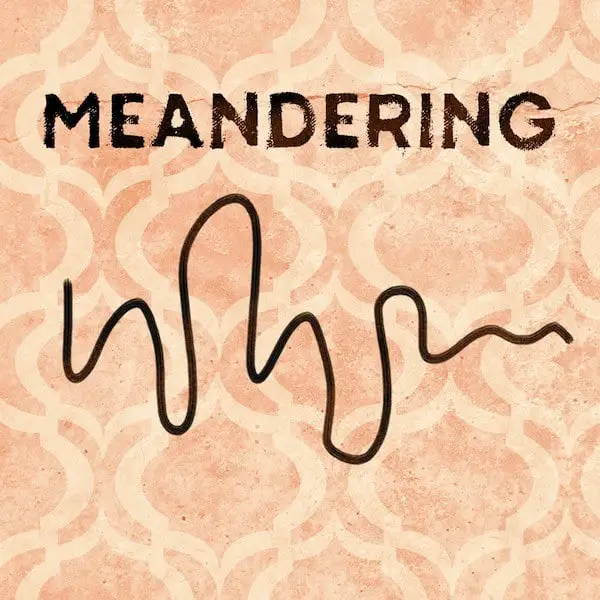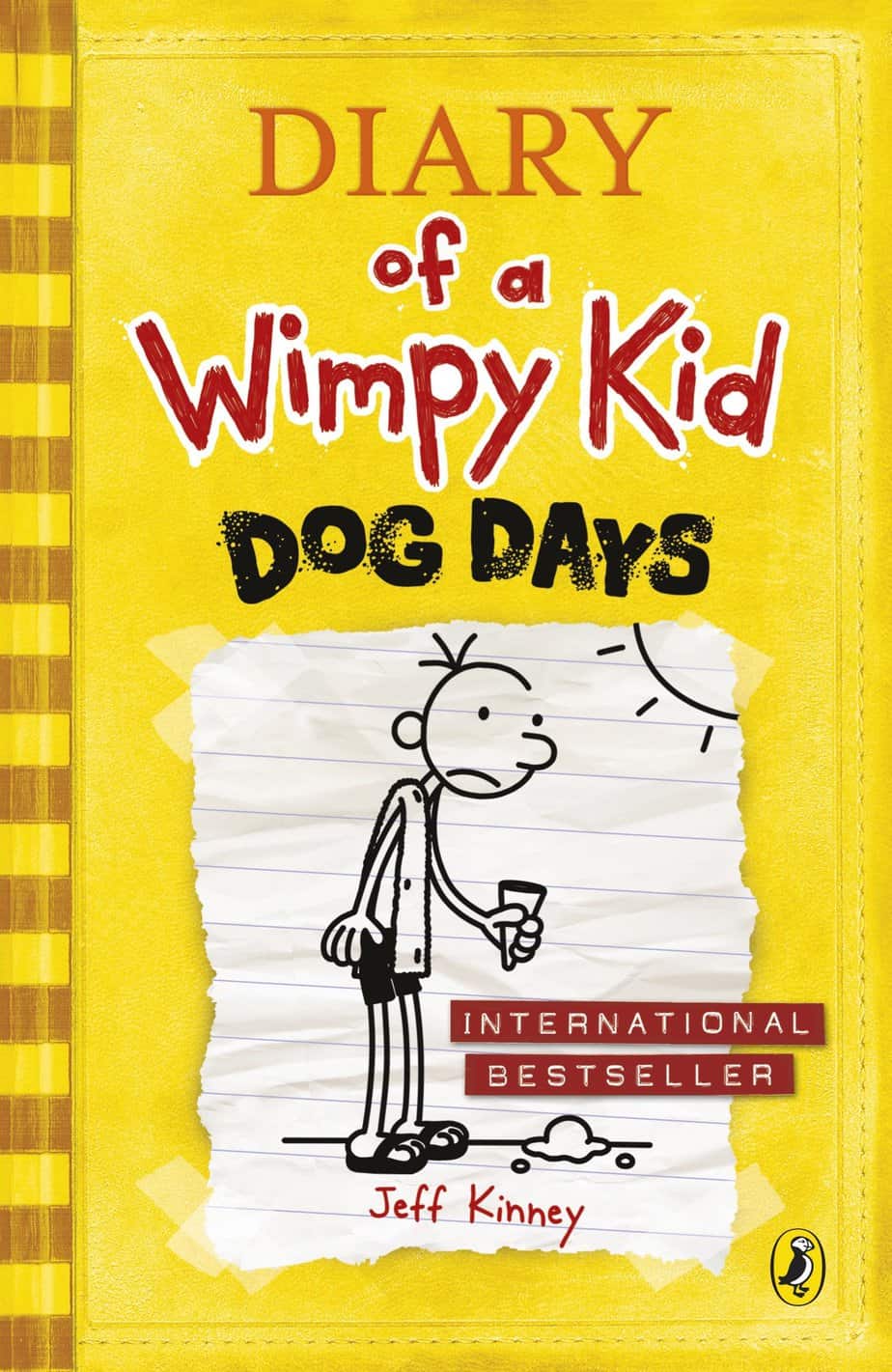Some have said that the Diary of a Wimpy Kid books have no plot, including Jeff Kinney himself. Is this really true? If so, the perennially popular Wimpy Kid series defies a ‘law’ of storytelling — a first of its kind.
Yesterday I read another book from the Wimpy Kid series and decided Dog Days story has a ‘meandering plot’.
Today I take a close look at a random Wimpy Kid book from my daughter’s shelf to see what people really mean when they say Jeff Kinney’s books have ‘no plot’.
STORY STRUCTURE OF DOG DAYS
How Events Are Connected
The scenes in a Wimpy Kid story are made up of events in the present (on the day of writing), events of the recent past (the last few days) or flashbacks from weeks/months/years ago.
One event in the present can spark an event in the past, providing a natural segue. Where there is no natural segue, Greg writes a new entry under a different day of the week.
- PRESENT: Mother insists Greg goes outside to play because Greg is in his room by himself under a blanket.
- RECENT PAST: Greg goes to country club with Rowley where a girl they invited ditches them
- FLASHBACK: Greg complained to Mr Jefferson about the fruit smoothies and other things but after complaining was uninvited to the country club
- Greg’s mother makes him go to the local pool, which is a comedown from the country club.
- FLASHBACK: Being terrified of the hairy naked men in the changing room
- PRESENT: Greg learns the family can’t afford to go to the beach this year.
- FLASHBACK: Last year he wouldn’t go into the surf because he realised sealife uses the sea as their toilet. He did enjoy a ride called the Cranium Shaker.
- PRESENT: Mother says they’ll have a fun holiday at home hanging around the local area. Greg is looking forward to his birthday and the final Lil Cutie comic running in the paper.
- ONGOING PRESENT: Argues with father about sleeping hours, screen time.
- PRESENT: Greg’s photo album, with big gaps in it due to him not being the first born. “I’ve learned that photos aren’t an accurate record of what happened in your life, anyway.”
- [Segue = Manny and mother seashell photo opportunity] FLASHBACK: Watching the same thing happen to his little brother, Greg realises mother bought seashells, buried them at the beach then took photos of Greg ‘finding’ them.
- [New thread] Mother takes Greg to get haircut at a salon where old ladies get theirs done. Greg gets addicted to soaps.
- [Segue = tabloids at the hairdresser] Grandmother isn’t using the phone because she read in a tabloid that they erase the memory of the elderly.
- RECENT PAST: Mum has been throwing out grandmother’s tabloids but Greg has been reading them before they get thrown out.
- PRESENT: At the hair salon, Greg had a long wait.
- RECENT PAST: The old ladies who work there have been gossiping to him.
- PRESENT: Mother interrupts story about Mr Peppers and Greg never gets to hear the end.
- PRESENT: Greg is now hooked on soap operas. Mother tells Greg to invite Rowley over. They go to the basement and riffle through Rodrick’s stuff. They find a horror film. They’ve never seen one before so Greg arranges for Rowley to stay the night.
- FLASHBACK: Last summer the boys had a sleepover in the basement. Rowley slept next to the boiler room because Greg is scared of it. They got spooked. This gag is a minor ghost story in which Greg tries to persuade his parents the house is haunted. But it was only one of Manny’s dolls.
- RECENT PAST: Last night (it’s more feasible that Greg is writing his diary the day following a sleepover) the move was about a muddy murdering hand which walks. They spent the rest of the night in the bathroom with the lights on and were found this morning by Mr Heffley.
- PRESENT: Yesterday mum gave Greg a lecture on horror movies. She has decided to start a reading club, which isn’t supposed to be a punishment but to Greg it is. This morning a few neighbourhood boys turned up.
- FLASHBACK: When Greg was 8 years old he borrowed a book from the library but is now terrified of the librarian because he’s sure he owes thousands in fines for losing it.
- PRESENT: This time it’s only Greg and Rowley at the book club.
- FLASHBACK: About a book with a scantily clad woman on the cover which Greg has read, and the book doesn’t have any women in it.
- PRESENT: Greg is the only one left in his mother’s book club.
- RECENT PAST: Greg hasn’t been able to get through his assigned reading because he’s distracted by the thought of the muddy hand coming to get him.
- and so on
This structure of scenes does make the plot seem in complete disarray (or ‘plotless’) but if you take away all the flashbacks and asides, there is a linear progression from ‘beginning of summer’ to ‘end of summer’. This is a Robinsonnade in the sense that Greg doesn’t go anywhere — unlike The Long Haul he is ‘marooned’ at home for much of it.
SHORTCOMING
I’m pretty sure Greg Heffley is on the psychopathic spectrum. His creator Jeff Kinney has said he never meant Greg to be a role model, but looking at the way he treats his friends, family and neighbours — he has no affinity to any of them. Not even to the dog who comes to stay. That personality trait leads to the inciting incident…
Without knowing (or caring) who has to pay for it, Greg and Rowley rack up a huge fruit smoothie at the country club snack bar, where Rowley’s father is a member. The reader sees him doing this, and like Greg, we pay no mind as to who is paying for all these drinks.
Some authors would introduce the issue of payment near the start, but in this story a lot of extraneous gags happen before we even realise this will be a problem. We are, however, shown within the first few pages that Greg has been drinking fruit smoothies.
DESIRE
On the first page we see that Greg only wants to sit inside under a blanket and play computer games all summer.
OPPONENT
As usual, the main opponent is Greg’s mother, who says it’s ‘not natural’ for boys to be spending so much time alone in their room. So she forces him out of the house.
PLAN
Greg plans to mooch of Rowley’s family’s country club membership while enjoying all the accoutrements of a lavish lifestyle, despite not really liking Rowley all that much. His unreliable, ironic narration has him complaining about the girl who ditched him and Rowley for the better-looking lifeguard. “The lesson I learned is that some people won’t think twice about ditching you, especially when there’s a country club involved.”
BIG STRUGGLE
Another reason this story feels without structure is because we’re mostly used to a structure which builds to some sort of climax. This is achieved partly by a series of big struggles which (in most stories) build in intensity until the big, final showdown where the hero comes close to death. There’s nothing like that in this book. Greg has many, many small big struggles but these don’t lead to anything massive. The whole point of these events in Greg’s empty summer is to demonstrate the wide-open, goal-less days in the Every Boy’s summer.
ANAGNORISIS
Turns out this is essentially a story about a father/son relationship. But in Greg Heffley style, the deep and meaningful messages found in serious literature is parodied. Greg doesn’t learn much at all:
I guess some people would say that hating a comic is a pretty flimsy foundation for a relationship, but the truth is, me and Dad hate LOTS of the same things.
Me and Dad might not have one of those close father-son relationships, but that’s fine with me. I’ve learned that there is such a thing as TOO close. [An image of Rowley on the toilet talking to his father at the vanity.]
NEW SITUATION
The holiday is ‘pretty much over’ when Mrs Heffley finishes the photo album. This final montage of the photo album is a one-image per gag rundown of each incident, but from the mother’s point of view. This provides some ironic distance between the mother and son’s version of events, and highlights the unreliable nature of Greg’s narration. We are reminded that the mother, too, only has a small part of the story of her son’s summer to document as she hasn’t the foggiest idea about all that goes on.
THE PLOT SHAPE OF DOG DAYS

Dog Days is far from plotless. If it appears plotless that is because it’s an example of a ‘meandering’ story structure, in which one event leads to flashbacks and asides. The hero has a desire, but it is not intense. He covers a great deal of territory in a haphazard way and he encounters a number of characters from different levels of society. Ulysses and Alice and Wonderland are well-known examples of the meandering plot, which foregrounds other aspects of story over the desire, plan and big struggle of the main character.
Dog Days is also a spoof on ‘serious literature’ of the sort put on summer reading lists by gatekeepers of children’s literature such as teachers and mothers. This is depicted by Mrs Heffley’s book club idea. If serious literature is meant to add to a child’s life, Greg’s summer is full of ‘mind-rotting’ activities eschewed by concerned adults such as playing video games, watching soaps, imbibing gossip at the beauty salon and reading trashy comics. No matter what Mrs Heffley tries to do to enrich her son’s life, Greg finds a way of turning even a trip to the pool into something ‘as bad as’ a horror movie.
The message of this book is that there is no message. Father and son remain united only by their common dislike of a comic, in which Jeff Kinney lampoons the mawkish comic strips often found in 20th century American newspapers. The epiphany, likewise, is that there is no substantial epiphany. In this respect (and this respect only), Dog Days is similar to Annie Proulx’s “The Half-skinned Steer” — another upending of a common mythic story structure.
By the way, do you know why ‘dog days’ refer to the hottest days of summer (in America)? Here in Australia we don’t even use that term, and here’s the reason why.

